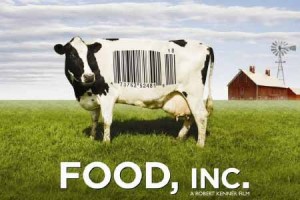 The latest salvo against the nation’s agricultural-industrial complex is on the big screen.
The latest salvo against the nation’s agricultural-industrial complex is on the big screen.
Food, Inc., a documentary by filmmaker Robert Kenner, is a forceful indictment of concentrated cattle ghettos, squalid chicken factories and cornfield deserts. At the film’s core is this thesis: the way we eat has changed more in the past 50 years than in the previous 10,000, and not for the better.
Sure, our shopping cart loads are getting cheaper, but our health, the environment, the animals and the people who handle them pay the price, Kenner argues.
“We spend less of our paycheck on our food than anytime, but it comes at a heavy cost,” Kenner told a crowd at the Aspen Institute’s Aspen Ideas Festival, after a screening of the film.
The seed for Food, Inc. was planted in 2002, when Kenner started talking with author Eric Schlosser after reading Fast Food Nation, his diatribe against the fast-food industry. Schlosser plays a central role in the film. So does Michael Pollen, author of The Omnivore’s Dilemma and In Defense of Food.
Readers of these books will find their themes played out on the screen: industrial agriculture has led to a system that no longer resembles farming. It gives cows E. coli, which gives us E. coli. Chickens are pumped full of hormones to give them big breasts, which pumps us full of hormones. Farmers are subsidized to overproduce corn, which overfills us with fattening corn syrup. Growers are pushed to raise genetically-modified crops, to their detriment.
“Food has been totally transformed in the last 100 years,” Kenner says, “and the scary thing is, so have we.”
Rep. Diana DeGette, D-Colo., has a cameo in the movie. When Barbara Kowalcyk’s 2 1/2-year-old son Kevin died from E. coli after eating tainted meat, she became a food safety advocate. When she appeared at DeGette’s office lobbying for tighter regulation, Kenner’s cameras followed her.
There’s good news for food safety proponents, says DeGette, who appeared at the film screening. A House committee has passed what she called “the most comprehensive food safety measure ever.”=. The measure, which has yet to see a vote in the Senate, would give the Food and Drug Administration mandatory recall powers, replacing the current voluntary recalls, and would mandate field-to-work traceability for agricultural products.
“I think we have a whole new food safety regime in Washington,” she says.
The film is decidedly one-sided, but don’t blame Kenner. Companies like Purdue, Tyson, Smithfield Farms and Monsanto all declined to appear in the film.
Not surprisingly, Food, Inc. can be a downer. If you can’t eat meat and you can’t eat vegetables, what’s left? But it’s not a stomach-turner. Happily, it keeps the most unpleasant abuses of animals and people off screen. And it combats the sense of helplessness that often surrounds documentaries by offering some real solutions. Buy organic. Support your local farmer’s market. Plant a garden.
Moves by Danone to buy organic yogurt maker Stonyfield Farm, for instance, and Wal-Mart’s ban on synthetic growth hormones, show the public can vote with their stomachs.
The film’s ultimate message: “You can work to change the system. Three times a day.”


